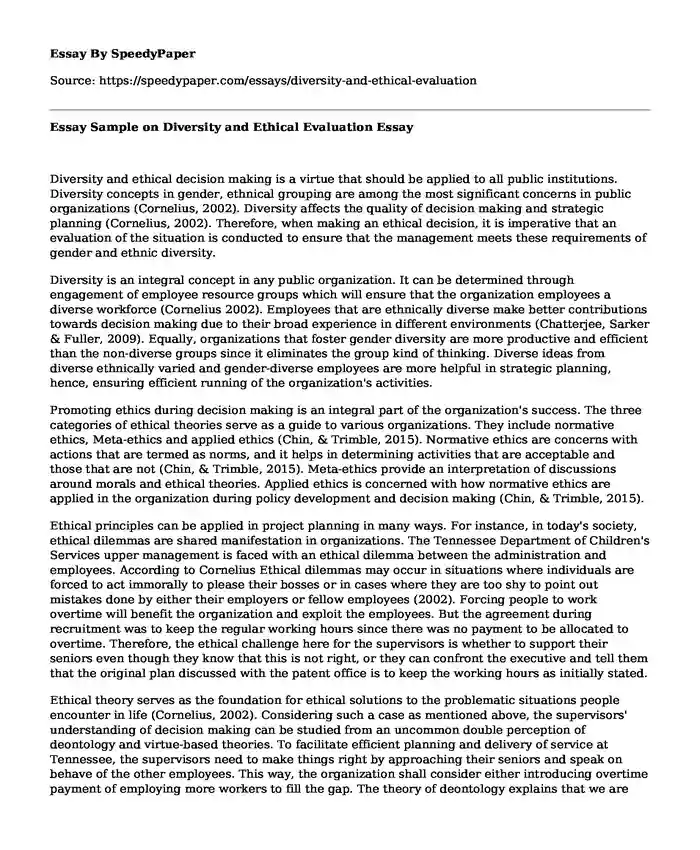Diversity and ethical decision making is a virtue that should be applied to all public institutions. Diversity concepts in gender, ethnical grouping are among the most significant concerns in public organizations (Cornelius, 2002). Diversity affects the quality of decision making and strategic planning (Cornelius, 2002). Therefore, when making an ethical decision, it is imperative that an evaluation of the situation is conducted to ensure that the management meets these requirements of gender and ethnic diversity.
Diversity is an integral concept in any public organization. It can be determined through engagement of employee resource groups which will ensure that the organization employees a diverse workforce (Cornelius 2002). Employees that are ethnically diverse make better contributions towards decision making due to their broad experience in different environments (Chatterjee, Sarker & Fuller, 2009). Equally, organizations that foster gender diversity are more productive and efficient than the non-diverse groups since it eliminates the group kind of thinking. Diverse ideas from diverse ethnically varied and gender-diverse employees are more helpful in strategic planning, hence, ensuring efficient running of the organization's activities.
Promoting ethics during decision making is an integral part of the organization's success. The three categories of ethical theories serve as a guide to various organizations. They include normative ethics, Meta-ethics and applied ethics (Chin, & Trimble, 2015). Normative ethics are concerns with actions that are termed as norms, and it helps in determining activities that are acceptable and those that are not (Chin, & Trimble, 2015). Meta-ethics provide an interpretation of discussions around morals and ethical theories. Applied ethics is concerned with how normative ethics are applied in the organization during policy development and decision making (Chin, & Trimble, 2015).
Ethical principles can be applied in project planning in many ways. For instance, in today's society, ethical dilemmas are shared manifestation in organizations. The Tennessee Department of Children's Services upper management is faced with an ethical dilemma between the administration and employees. According to Cornelius Ethical dilemmas may occur in situations where individuals are forced to act immorally to please their bosses or in cases where they are too shy to point out mistakes done by either their employers or fellow employees (2002). Forcing people to work overtime will benefit the organization and exploit the employees. But the agreement during recruitment was to keep the regular working hours since there was no payment to be allocated to overtime. Therefore, the ethical challenge here for the supervisors is whether to support their seniors even though they know that this is not right, or they can confront the executive and tell them that the original plan discussed with the patent office is to keep the working hours as initially stated.
Ethical theory serves as the foundation for ethical solutions to the problematic situations people encounter in life (Cornelius, 2002). Considering such a case as mentioned above, the supervisors' understanding of decision making can be studied from an uncommon double perception of deontology and virtue-based theories. To facilitate efficient planning and delivery of service at Tennessee, the supervisors need to make things right by approaching their seniors and speak on behave of the other employees. This way, the organization shall consider either introducing overtime payment of employing more workers to fill the gap. The theory of deontology explains that we are morally indebted to act in accord with a firm set of principles and rules notwithstanding of outcome (Chatterjee, Sarker & Fuller, 2009).
Diversity and ethics play a significant role in organizations' daily operations. Having a diversity team contributes positively to an organization's progress. They give different ideas hence diversifying decisions which make it easier to make better decisions than non-diverse situations. People of the same gender or ethnic group will tend to think in a similar way which may negatively affect decision making which will, in turn, affect strategic planning.
References
Chatterjee, S., Sarker, S., & Fuller, M. A. (2009). A Deontological Approach to Designing Ethical Collaboration. Journal of the Association for Information Systems, 10(3), 138-169.
Chin, J. L., & Trimble, J. E. (2015). Diversity and leadership. Los Angeles: SAGE.
Cornelius, N. (2002). Building workplace equality: Ethics, diversity, and inclusion. London: Thomson.
Cite this page
Essay Sample on Diversity and Ethical Evaluation. (2022, Dec 08). Retrieved from https://speedypaper.com/essays/diversity-and-ethical-evaluation
Request Removal
If you are the original author of this essay and no longer wish to have it published on the SpeedyPaper website, please click below to request its removal:
- Free Essay on How to Motivate Students Who Don't Care
- Essay Sample on Effects of Technology on the American Society
- Human Errors in Aviation, Free Essay for Your Use
- Japanese Anime Popular Culture, Essay Sample for You
- Essay Sample: Fear and Anxiety in Learning a Foreign Language
- Essay Sample about Islamic Art and the West before 1200
- Free Essay Example: Political Representation for Women
Popular categories





